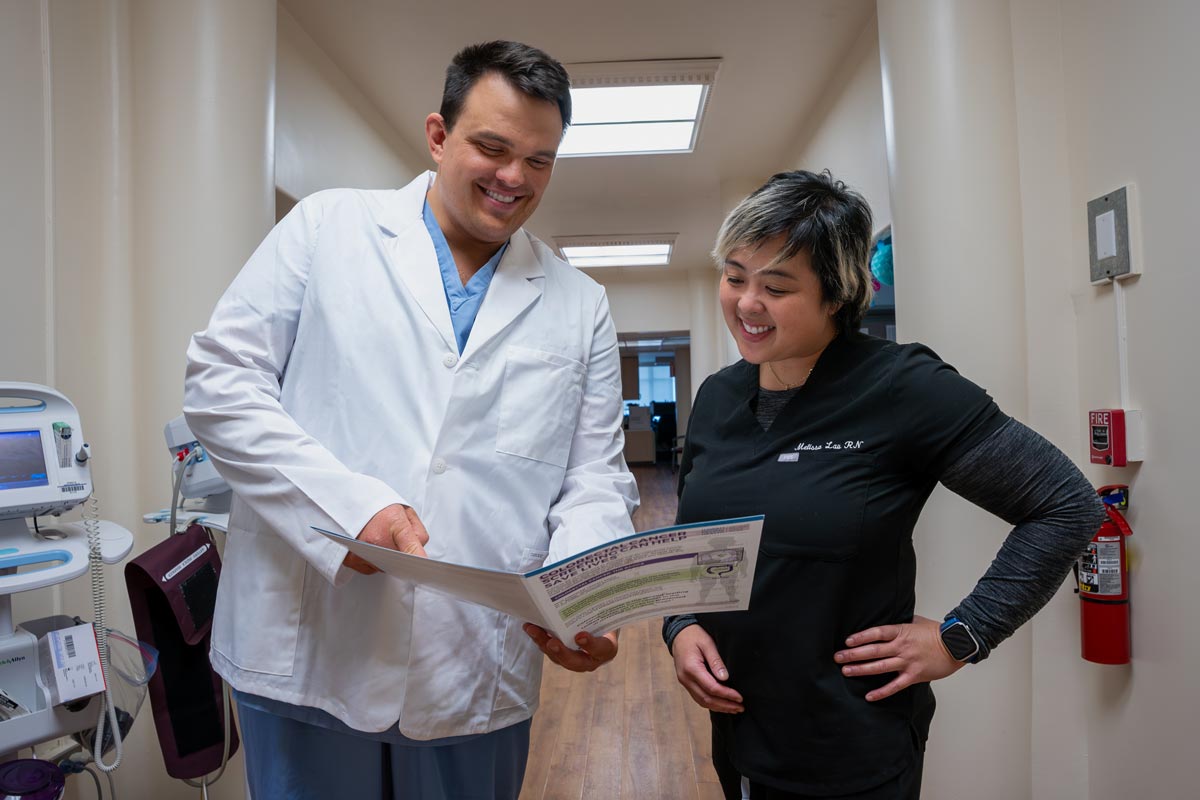
A Focus on Colorectal Cancer
Adjusted for age, the rate of colorectal cancer in Hawaii is higher than the national average, and that has experts concerned.
"According to the latest data, approximately 717 new cases of colorectal cancer are diagnosed annually in Hawaii. In addition, Native Hawaiians experience higher colorectal cancer mortality rates than many other ethnicities," said Dr. Robert J. Pattison, a Hawaii Pacific Health Medical Group gastroenterologist based at Straub Benioff Medical Center.
Pattison earned his medical degree from the Medical College of Wisconsin and a master's in public health at the University of Wisconsin-Madison. He completed his residency in internal medicine at University of Hawaii Manoa John A. Burns School of Medicine, then went on to a fellowship in gastroenterology at Sunrise Health in Las Vegas. In addition, he completed the visiting fellowship funded by the Crohn's and Colitis Foundation at Mount Sinai Hospital in New York, specifically focused on inflammatory bowel disease.
Pattison appeared in MidWeek during Colorectal Cancer Awareness Month. In this article, he discusses the risk factors for colorectal cancer, why screenings are so important and more.
What is colorectal cancer?
Colorectal cancer starts in the rectum or colon as a small growth called a polyp. If the polyp is not removed, it can develop into cancer over time.
What are the symptoms? What are the risk factors?
Risk factors for getting colorectal cancer include genetics, diets that include a lot of red or processed meats, a family history of colorectal cancer, smoking and heavy alcohol consumption. People 50 years and older are more likely to develop it. However, colorectal cancer often occurs in individuals who do not have any risk factors.
One important thing people should know is that polyps and colorectal cancers often do not cause symptoms until the advanced stages. For this reason, screening colonoscopies are essential even if you are feeling well.
How do you treat colorectal cancer?
Treating colorectal cancer can be difficult, depending on the stage in which it was diagnosed. Typically, it involves surgery, chemotherapy and radiation. However, we aim to prevent this by providing high-quality colonoscopies.
What should people know about screenings?
Colorectal cancer is preventable if diagnosed early. There are several screening options. Some are noninvasive, such as blood or stool tests. However, these methods are not as effective or accurate as the screening colonoscopy. In fact, doctors can diagnose and remove precancerous polyps during the procedure. A colonoscopy is the only way to do this at the same time.
However, some people are hesitant to get one. Rest assured, you can talk to your gastroenterologist about any concern you might have. There is nothing we haven't heard!
The biggest reason people do not want to get a colonoscopy is because of the preparation. Don't let that discourage you – now there are many very palatable options.
It is very important to finish the entire prep so the gastroenterologist can fully examine the colon. If they cannot, you may be asked to repeat the procedure.
Most patients are relieved once it is done and say that the experience was a lot easier than they thought. I have never had a patient regret getting a colonoscopy.
What should people know about inflammatory bowel disease?
Inflammatory bowel disease (IBD) is a chronic disorder that causes inflammation in the gut. Patients with it may have stomach pains, diarrhea, bleeding, weight loss and extreme fatigue.
The two main types of IBD are Crohn's disease and ulcerative colitis. In Hawaii, IBD is relatively rare. However, its incidence is rising.
Fortunately, we have many highly effective medications to keep the disease in check. If you have been diagnosed with one of these diseases, it is essential to see a gastroenterologist to keep your disease in remission and avoid complications.
This article was first featured in the March 26, 2025, issue of MidWeek as a part of the “Dr. in the House” series. See the full publication.
Published on: March 27, 2025




